Join our December seminar on Teams tomorrow at 12pm, any questions email CMWH@bournemouth.ac.uk
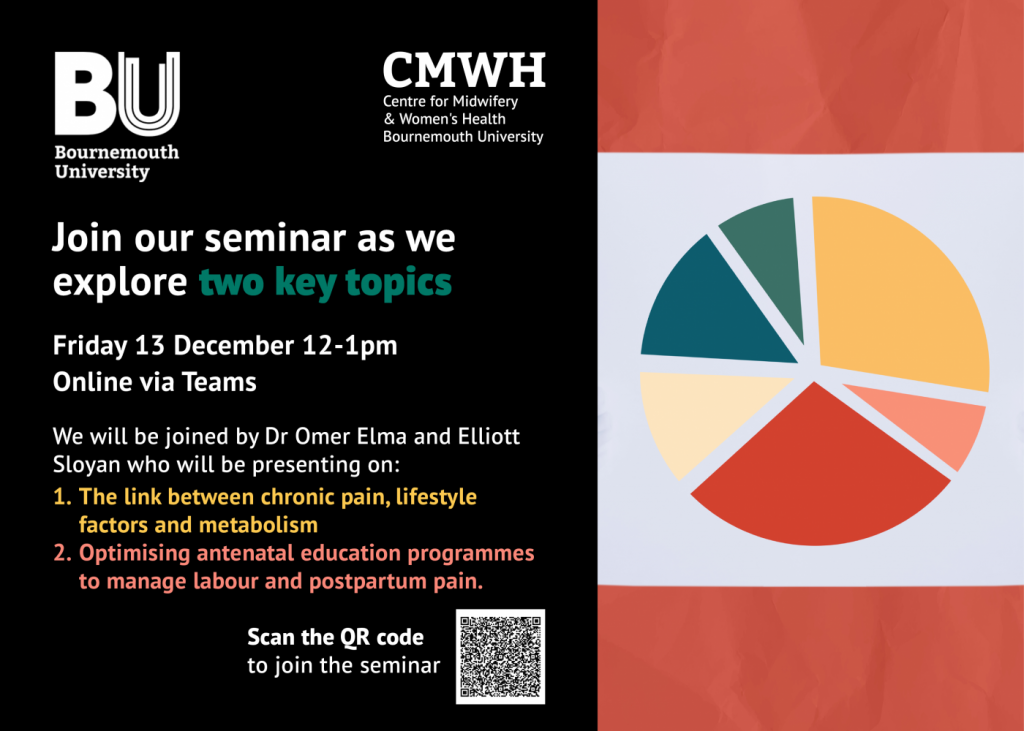
Latest research and knowledge exchange news at Bournemouth University

Race Equity Month – Can the UK finally tackle health disparities in maternity care?
Last week Prof. Hora Sultani, who leads the joint bid submitted by Sheffield Hallam University (SHU) and Bournemouth University (BU) in reply to the ‘NIHR Challenge: Maternity Inequalities funding call’, wrote an article on the website of the Council of Deans for Health. This piece with the title ‘Race Equity Month – Can the UK finally tackle health disparities in maternity care?‘ can be freely accessed (click here!). One of Prof. Soltani’s key arguments is that it is vital that national policy makers and service providers collaborate with researchers and communities to co-design and provide practical solutions for such important maternity challenges in UK society.
Prof. Soltani was writing on behalf of the UK Network of Professors in Midwifery and Maternal and Newborn Health, an organisation to which both Profs Hundley and van Teijlingen belong.
Last month ResearchGate informed us that our paper ‘Methods or Methodology: Terms That Are Too Often Confused’ has been read 300 times [1]. This paper started as a discussion among the authors about how many students, researchers, and authors of academic papers do not seem to know the difference between methodology and methods. This is true in many academic disciplines.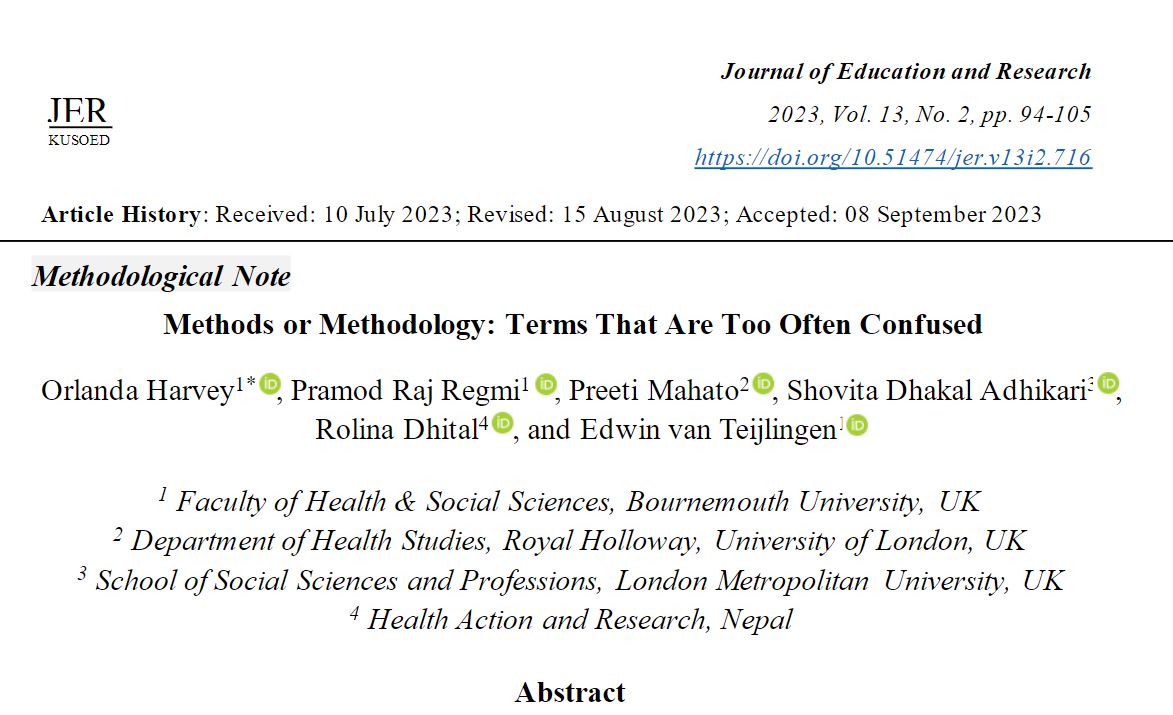
In simple terms, the term methods refers to the research tools and techniques; for example, in the qualitative field, interviews are a tool to collect data, and in the quantitative field, a questionnaire-based survey is an example of a data collection tool. Methodology is a broader concept as it refers to the overall approach to the research, includes a justification for this approach, and links to research philosophy, i.e., how we produce knowledge. This methodological note aims to explain the confusion, drawing on examples from the published literature in education research and beyond. It also considers the complexities and crossovers. The final section ends with key advice to researchers and authors on key mistakes to avoid regarding the difference between methods and methodology, including covering this in early supervision discussions.
Prof. Edwin van Teijlingen

Reference:

Wednesday saw the opening of the exhibition ‘Creative Health Nepal’ in Kathmandu. Creative Health Nepal reflects our interdisciplinary public health work, for the website click here! Our work on alcohol in Nepal’s society, which resulted in the paper ‘Participatory asset mapping and photovoice interviews to scope cultural and community resources to reduce alcohol harm in Chitwan, Nepal’ was represented in the exhibition.

Prof. Edwin van Teijlingen
Reference:
Dhital R, Yoeli H, Adhikari A, et al. Participatory asset mapping and photovoice interviews to scope cultural and community resources to reduce alcohol harm in Chitwan, Nepal. Perspectives in Public Health. 2024;144(5):312-323. doi:10.1177/17579139231180744
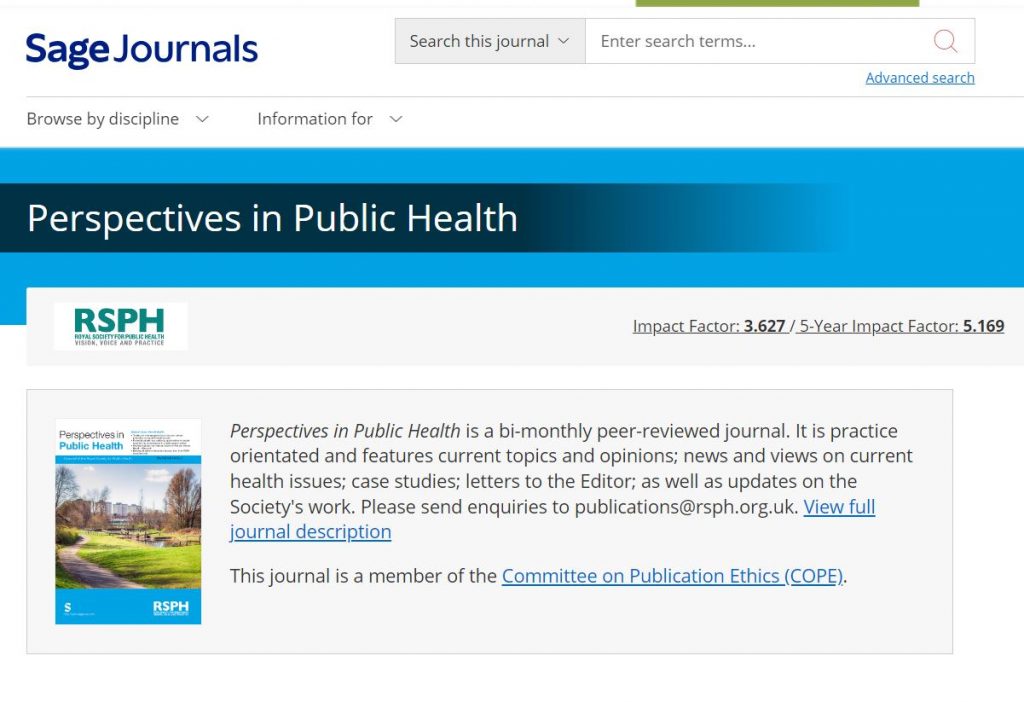
As part of our long-standing Memorandum of Agreement between Bournemouth University and Manmohan Memorial Institute of Health Sciences (MMIHS) in Nepal, Dr. Pramod Regmi taught a postgraduate class in Kathmandu last week. Pramod, who is Principal Academic in International Health in the Centre for Wellbeing and Long-term Health (CWLTH) in the Faculty of Health & Social Sciences, 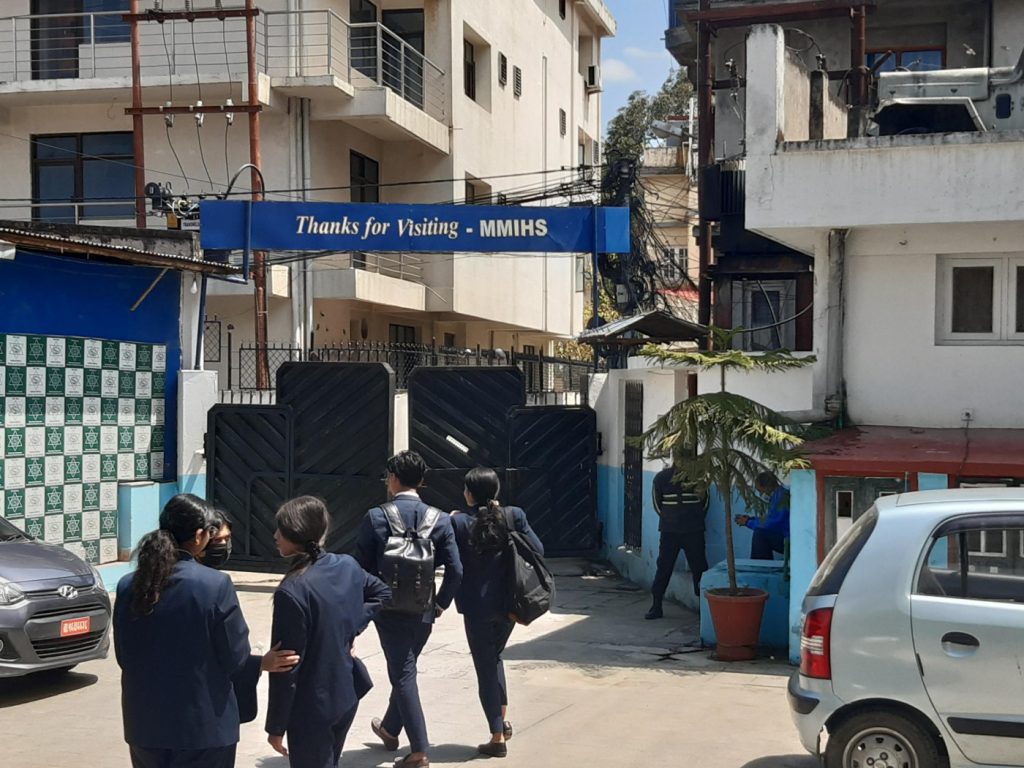 addressed M.Sc. students about the finer aspects of research methods. Tomorrow (Sunday 24th November) I have been invited to speak to the same MMIHS postgraduate students about research theories and paradigms.
addressed M.Sc. students about the finer aspects of research methods. Tomorrow (Sunday 24th November) I have been invited to speak to the same MMIHS postgraduate students about research theories and paradigms.
The process of internationalising higher education institutions through collaborative partnerships like this one between BU and MMIHS, brings benefits to both institutions’ staff and students. This collaboration has led to many BU staff and students visiting Nepal, and many MMIHS staff and student visiting Bournemouth. The collaboration has also led to several successful grant applications and nearly twenty academic publications [1-17].
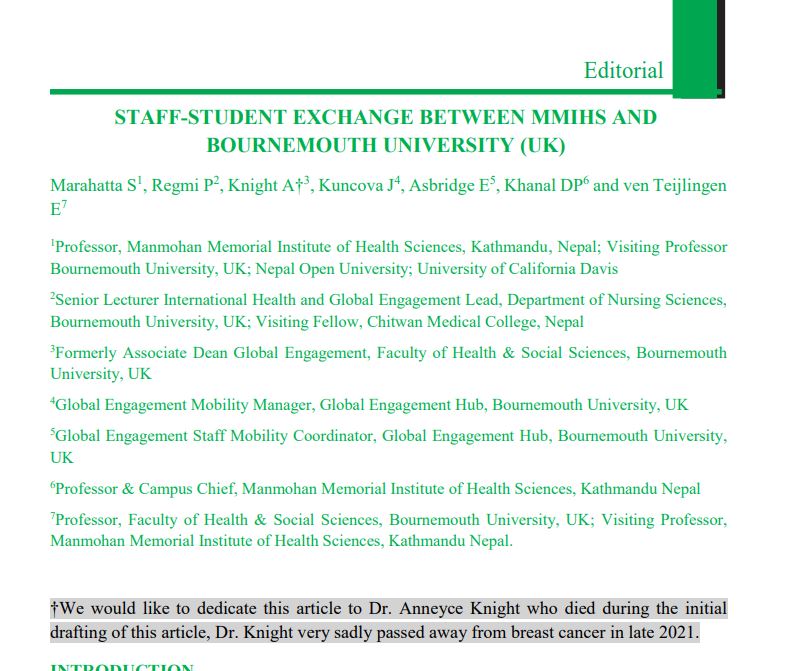
Prof. Edwin van Teijlingen
References (BU + MMIHS authors in bold):
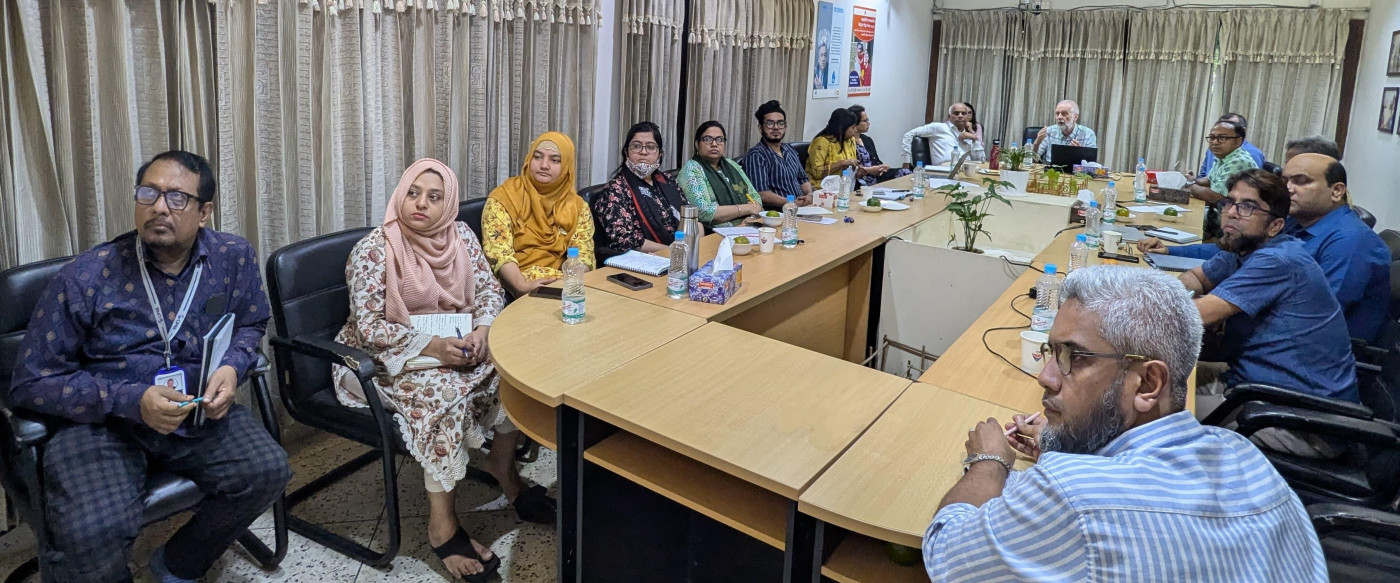 Yesterday I had the pleasure to delivery two research capacity building workshop sessions in Dhaka with staff at CIPRB (Centre for Injury Prevention and Research, Bangladesh). I was in Bangladesh as part of our Sonamoni project, this interdisciplinary project is jointly coordinated by Bournemouth University and CIPRB, in also includes the University of the West of England, Bristol, the University of Southampton, Design Without Borders (DWB) in Uganda, and the Royal National Lifeboat Institution (RNLI). We are working to reduce drownings among newly-mobile children, generally those under two years old. This £1.6m project has been made possible by a grant from the National Institute for Health and Care Research (NIHR) through its Research and Innovation for Global Health Transformation programme.
Yesterday I had the pleasure to delivery two research capacity building workshop sessions in Dhaka with staff at CIPRB (Centre for Injury Prevention and Research, Bangladesh). I was in Bangladesh as part of our Sonamoni project, this interdisciplinary project is jointly coordinated by Bournemouth University and CIPRB, in also includes the University of the West of England, Bristol, the University of Southampton, Design Without Borders (DWB) in Uganda, and the Royal National Lifeboat Institution (RNLI). We are working to reduce drownings among newly-mobile children, generally those under two years old. This £1.6m project has been made possible by a grant from the National Institute for Health and Care Research (NIHR) through its Research and Innovation for Global Health Transformation programme.
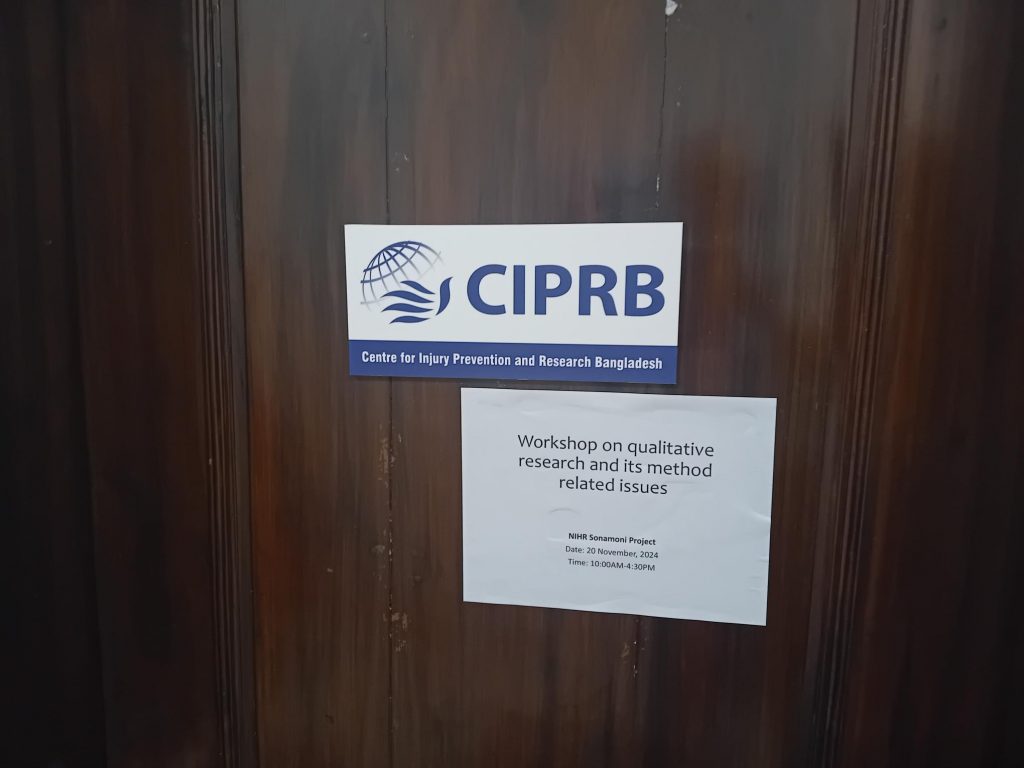 Two sessions covered qualitative research approaches in the morning and academic writing and publishing in the afternoon. The sessions were attended by staff involved in the Sonamoni project but we made it open to other CIPRB staff and in total 18 people attended. BU’s contributions to capacity-building initiatives aim to develop our collaborators’s research staff’s skills and increase their confidence in conducting qualitative research as well as publishing it.
Two sessions covered qualitative research approaches in the morning and academic writing and publishing in the afternoon. The sessions were attended by staff involved in the Sonamoni project but we made it open to other CIPRB staff and in total 18 people attended. BU’s contributions to capacity-building initiatives aim to develop our collaborators’s research staff’s skills and increase their confidence in conducting qualitative research as well as publishing it.
Professor Edwin van Teijlingen
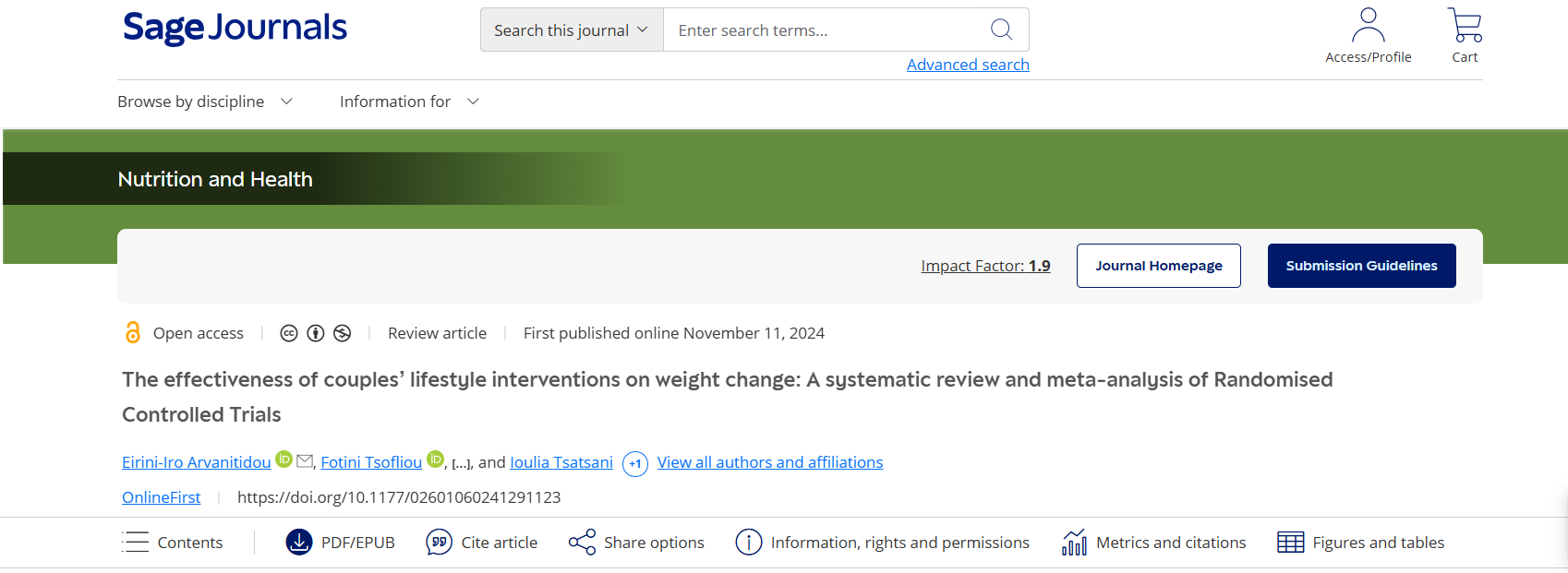 Congratulations to Faculty of Health & Social Sciences (FHSS) PhD student colleagues Dr. The effectiveness of couples’ lifestyle interventions on weight change: A systematic review and meta-analysis of Randomised Controlled Trials‘.
Congratulations to Faculty of Health & Social Sciences (FHSS) PhD student colleagues Dr. The effectiveness of couples’ lifestyle interventions on weight change: A systematic review and meta-analysis of Randomised Controlled Trials‘.
Iro is a PhD student and this systematic review and meta-analysis is the first to investigate the effectiveness of lifestyle interventions targeting couples on weight loss, compared to interventions focused on individuals or standard care. The findings suggest that interventions aimed at couples lead to greater weight loss, though the results should be interpreted with caution due to the wide heterogeneity among the studies. The authors conclude that further research is needed with evidence-based study designs, targeting younger participants, and incorporating intervention of longer duration, and longer follow-up periods.
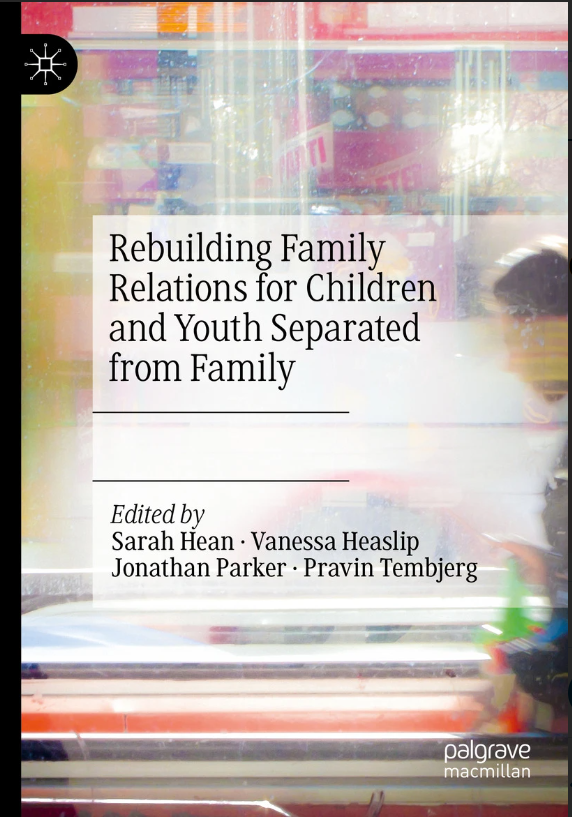 Bournemouth University Emeritus Professor, Jonathan Parker, now Health Services University, UK, former BU academic Professor Vanessa Heaslip, now Salford University and Professor Sarah Hean and Pravin Tembjerg from the University of Stavanger, Norway, are pleased to announce the publication of their edited international research collection Rebuilding Family Relations for Children and Youth Separated from Family. This edited volume is published by Palgrave Macmillan.
Bournemouth University Emeritus Professor, Jonathan Parker, now Health Services University, UK, former BU academic Professor Vanessa Heaslip, now Salford University and Professor Sarah Hean and Pravin Tembjerg from the University of Stavanger, Norway, are pleased to announce the publication of their edited international research collection Rebuilding Family Relations for Children and Youth Separated from Family. This edited volume is published by Palgrave Macmillan.
This edited volume explores a range of causes for separation of children and young people from family, the impact of these causes, and methods that both professionals and families may employ to build or rebuild these relations. In particular, contributions focus on six high priority crises through which children and young people become either permanently or temporarily separated from their families: removal by child welfare services, migration, family breakdown, placement into institutional care, incarceration and/or the death of a parent. Contributors include scholars in social work, psychology, health, sociology, social policy, and political science and the work develops co-production participatory research methods and tools in addition to empirical research to enhance professional practice.
Congratulations!
Prof. Edwin van Teijlingen
 This week I had the pleasure of visiting one of the two major research sites of our Sonamoni project. Sonamoni is jointly coordinated by Bournemouth University in collaboration with the Centre for Injury Prevention and Research, Bangladesh (CIPRB), the University of the West of England, Bristol, the University of Southampton, Design Without Borders (DWB) in Uganda, and the Royal National Lifeboat Institution (RNLI). We are working to reduce drownings among newly-mobile children, generally those under two years old. This £1.6m project has been made possible thanks to a grant from the National Institute for Health and Care Research (NIHR) through their Research and Innovation for Global Health Transformation programme. Yesterday CIPRB staff Prof. Dr. Aminur Rahman and Mr. Notan Chandra Dutta took me to the field site in Kalapari in rural Bangladesh.
This week I had the pleasure of visiting one of the two major research sites of our Sonamoni project. Sonamoni is jointly coordinated by Bournemouth University in collaboration with the Centre for Injury Prevention and Research, Bangladesh (CIPRB), the University of the West of England, Bristol, the University of Southampton, Design Without Borders (DWB) in Uganda, and the Royal National Lifeboat Institution (RNLI). We are working to reduce drownings among newly-mobile children, generally those under two years old. This £1.6m project has been made possible thanks to a grant from the National Institute for Health and Care Research (NIHR) through their Research and Innovation for Global Health Transformation programme. Yesterday CIPRB staff Prof. Dr. Aminur Rahman and Mr. Notan Chandra Dutta took me to the field site in Kalapari in rural Bangladesh.
This was my first ever visit to Bangladesh despite earlier attempts to go out there two and three decades ago. This visit included an outdoor meeting with a Village Injury Prevention Committee (VIPC) with whom CIPRB has been working for years in harmony.
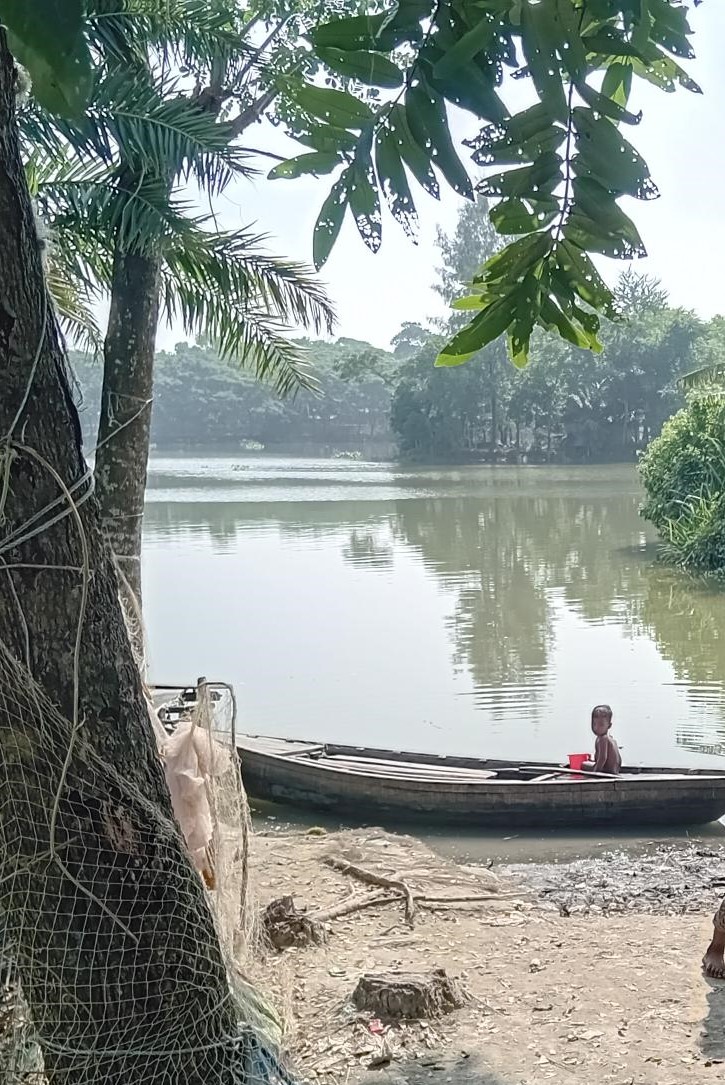 The Bournemouth University team comprises staff from three faculties: Dr. Mavis Bengtsson, Dr. Kyungjoo Cha, Dr. Mehdi Chowdhury, Dr. Yong Hun Lim, Mr. John Powell, and Prof. Edwin van Teijlingen, and Ph.D. student Mr. Md. Shafkat Hossain. For more information about our ongoing research in Bangladesh, please visit the NIHR website.
The Bournemouth University team comprises staff from three faculties: Dr. Mavis Bengtsson, Dr. Kyungjoo Cha, Dr. Mehdi Chowdhury, Dr. Yong Hun Lim, Mr. John Powell, and Prof. Edwin van Teijlingen, and Ph.D. student Mr. Md. Shafkat Hossain. For more information about our ongoing research in Bangladesh, please visit the NIHR website.
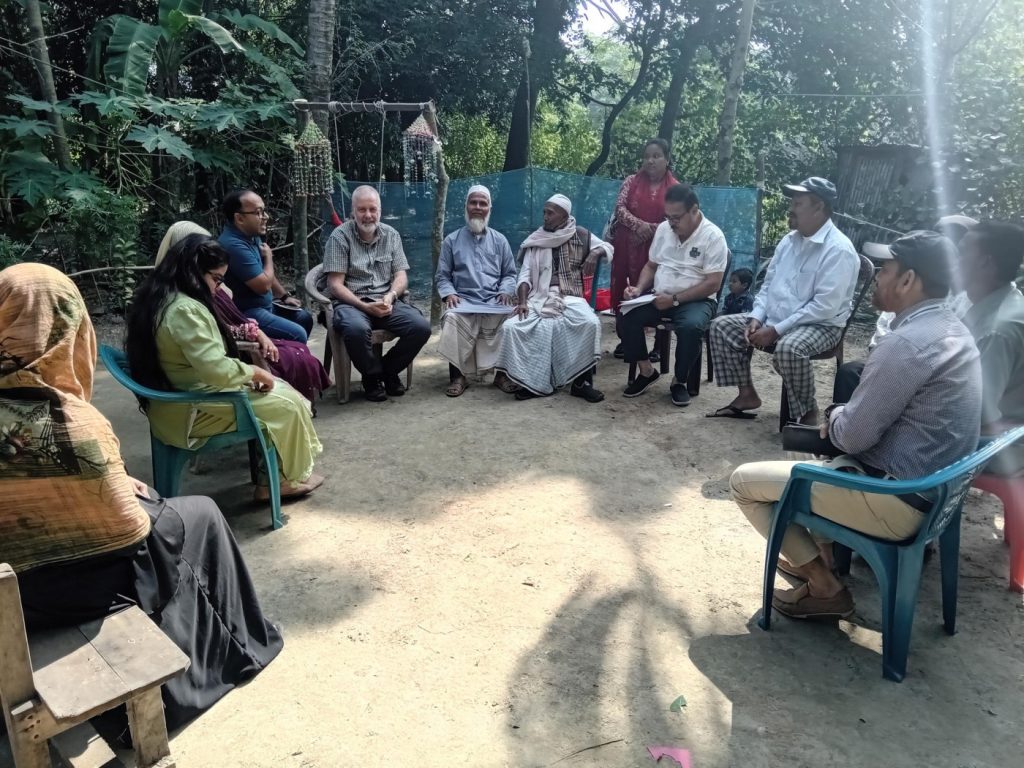
Prof. Edwin van Teijlingen
Centre for Midwifery & Women’s Health (CMWH)
This week the world rankings were announced by AD Scientific Index 2025. The Bournemouth University (BU) rankings can be found here! As it previous years the highest ranking BU academic is Dimitrios Buhalis, Professor in Marketing, Strategy and Innovation, followed by Jian Jun Zhang, Professor of Computer Animation, and Edwin van Teijlingen, Professor of Reproductive Health. AD Scientific Index evaluates the academic productivity and efficiency of scientists and institutions based on the h-index, i10 index, and citation counts. In addition to total h-index rankings, you can also explore rankings and analyses by “Scientists Last 6 Years H-index” and by discipline /subject.
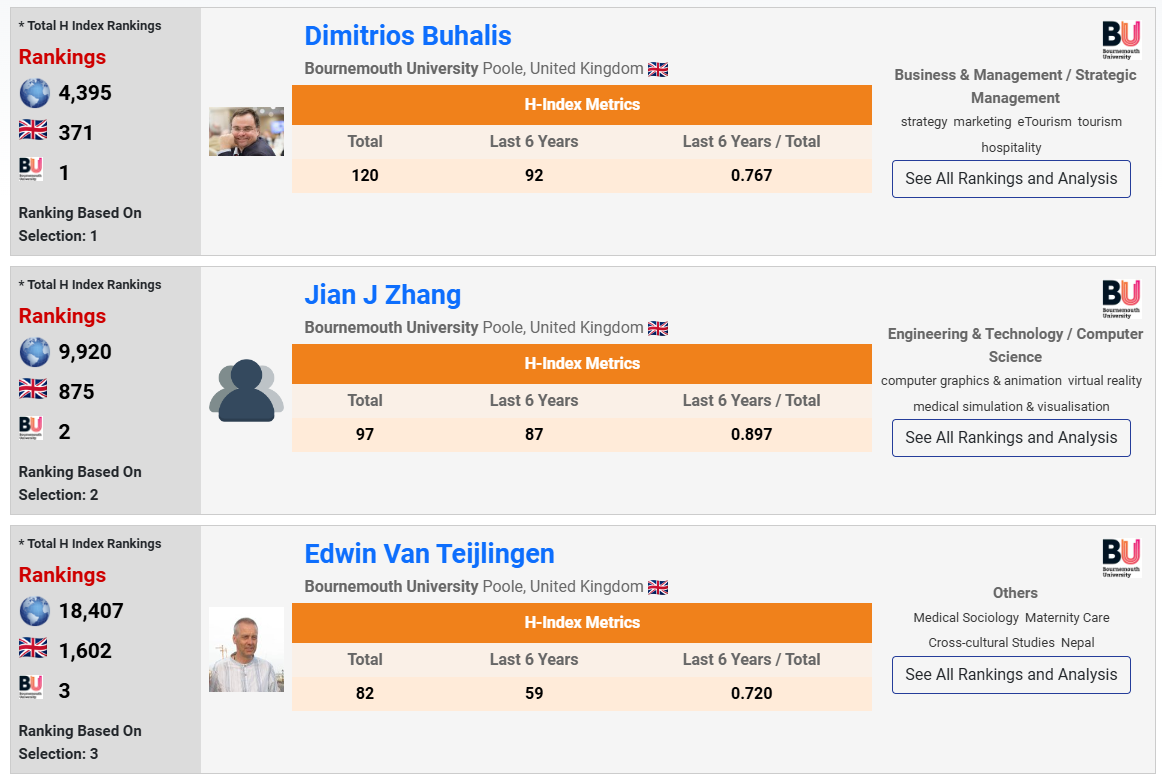
.
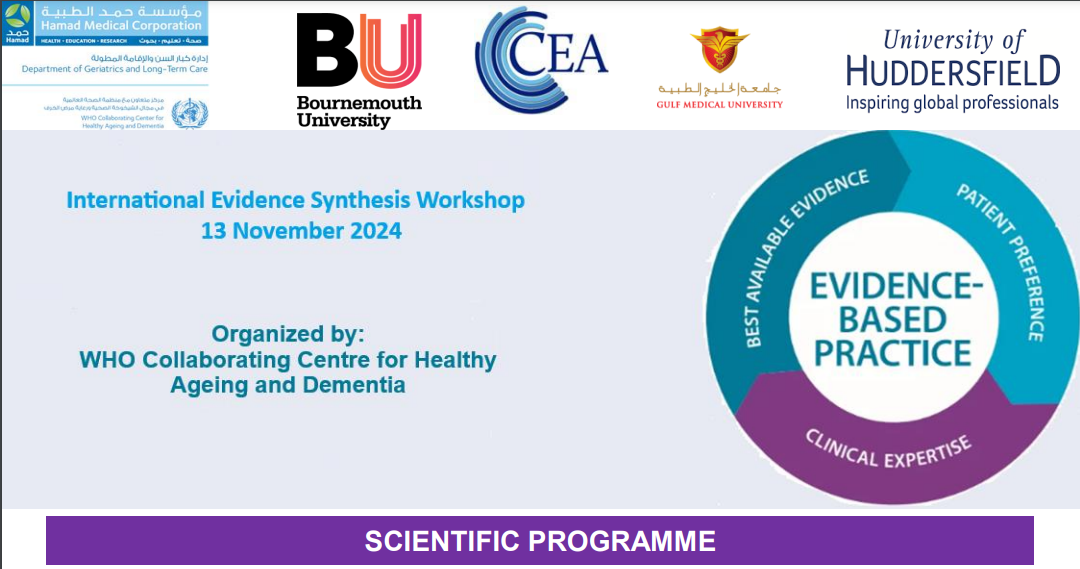 Early next week Prof. Edwin van Teijlingen from the Centre for Midwifery & Women’s Health (CMWH) has been invited to present online at the International Evidence Synthesis Workshop on November 13th in Qatar. His presentation will focus on key aspects of writing up systematic reviews. The workshop is organised by the WHO (World Health Organization) Collaborating Centre for Healthy Ageing and Dementia.
Early next week Prof. Edwin van Teijlingen from the Centre for Midwifery & Women’s Health (CMWH) has been invited to present online at the International Evidence Synthesis Workshop on November 13th in Qatar. His presentation will focus on key aspects of writing up systematic reviews. The workshop is organised by the WHO (World Health Organization) Collaborating Centre for Healthy Ageing and Dementia. 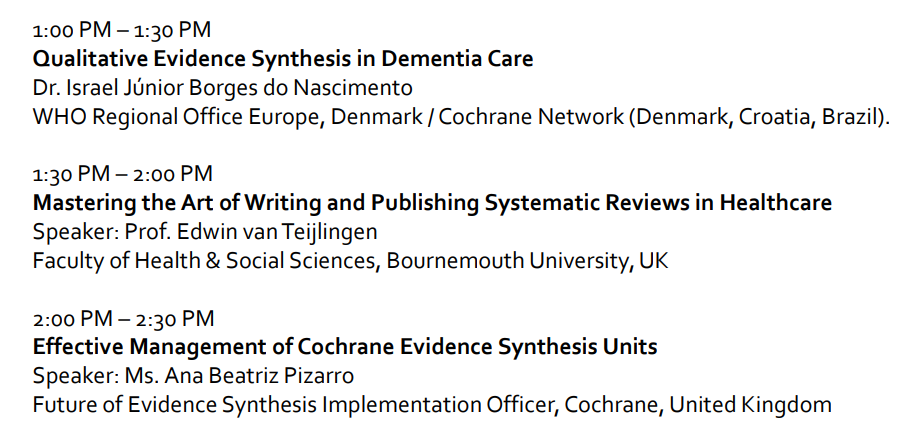
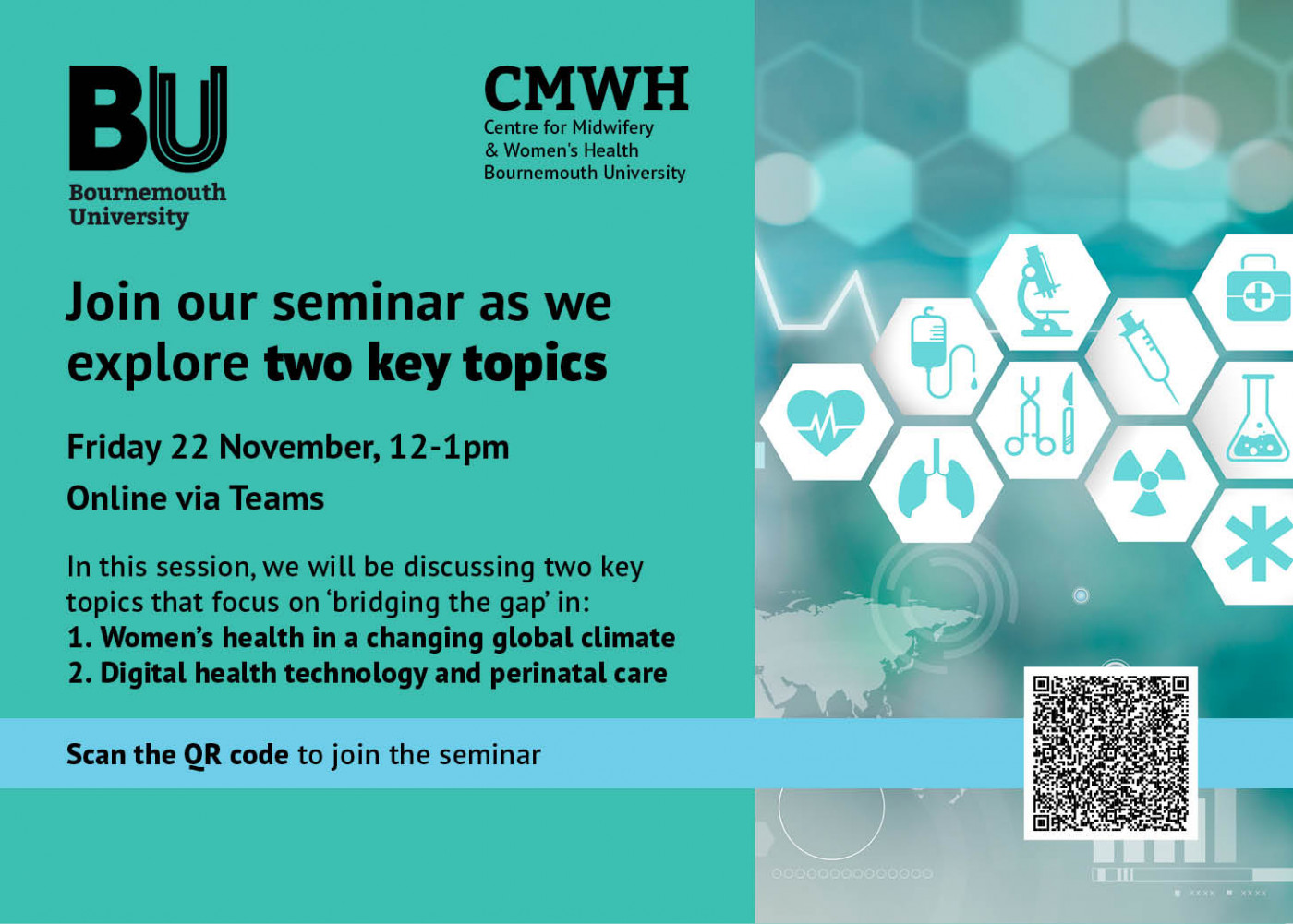

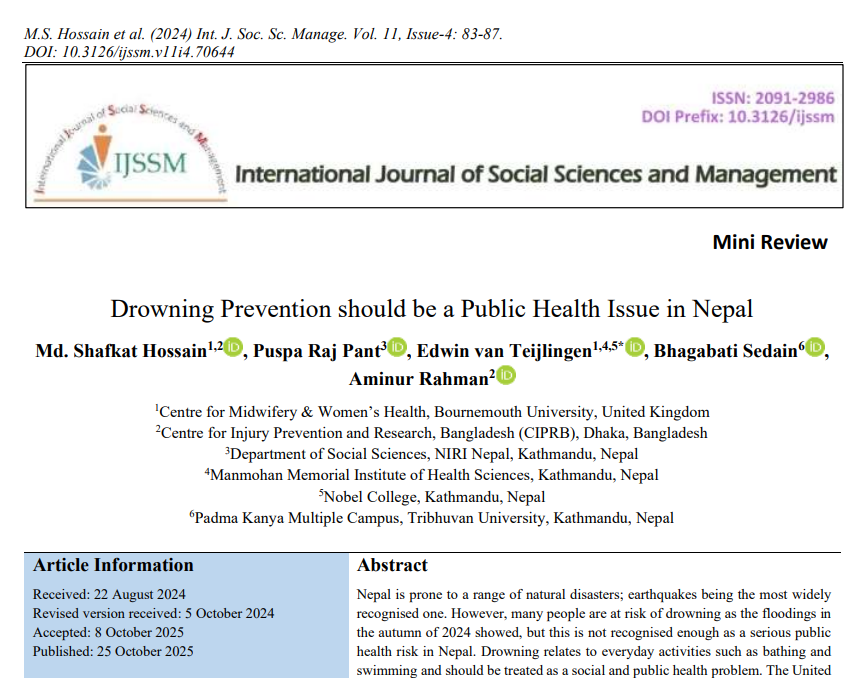 This week the editor of the International Journal of Social Sciences and Management emailed that the paper ‘Drowning Prevention should be a Public Health Issue in Nepal‘ [1] had been published. This is the first paper for our Ph.D. student Md. Shafkat Hossain. Shafkat co-authored this paper drowning prevention experts in Nepal, Dr. Bhagabati Sedain and Dr. Puspa Rai Pant and Prof. Aminur Rahman based at CIPRB (the Centre for Injury Prevention and Research, Bangladesh).
This week the editor of the International Journal of Social Sciences and Management emailed that the paper ‘Drowning Prevention should be a Public Health Issue in Nepal‘ [1] had been published. This is the first paper for our Ph.D. student Md. Shafkat Hossain. Shafkat co-authored this paper drowning prevention experts in Nepal, Dr. Bhagabati Sedain and Dr. Puspa Rai Pant and Prof. Aminur Rahman based at CIPRB (the Centre for Injury Prevention and Research, Bangladesh).
Shafkat’s thesis is part of the interdisciplinary Sonamoni project on drowning prevention in toddlers under the age of two in Bangladesh. 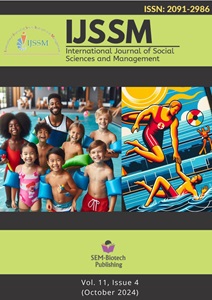 This newly published paper takes lessons learnt from Bangladesh and offers them as ideas to be considered in Nepal. Nepal is prone to a range of natural disasters; earthquakes being the most widely recognised one. However, many people are at risk of drowning as the serious flooding in the autumn of 2024 showed, but this is not recognised as a serious public health risk in Nepal. Drowning relates to people’s everyday activities such as crossing rivers, bathing and swimming and should be treated as a social and public health problem.
This newly published paper takes lessons learnt from Bangladesh and offers them as ideas to be considered in Nepal. Nepal is prone to a range of natural disasters; earthquakes being the most widely recognised one. However, many people are at risk of drowning as the serious flooding in the autumn of 2024 showed, but this is not recognised as a serious public health risk in Nepal. Drowning relates to people’s everyday activities such as crossing rivers, bathing and swimming and should be treated as a social and public health problem.

The Sonamoni project is being coordinated by Bournemouth University in collaboration with the University of the West of England, Bristol, the University of Southampton, the Royal National Lifeboat Institution (RNLI), CIPRB in Bangladesh and Design Without Borders in Uganda. It funded by the National Institute for Health and Care Research (NIHR) through its Research and Innovation for Global Health Transformation programme. For more information, visit the NIHR website.
As we are reaching the end of Open Access Week is worth highlighting that this paper is fully Open Access, and hence freely available in both Nepal and Bangladesh!
Prof. Edwin van Teijlingen
Centre for Midwifery & Women’s Health

Reference:
Yesterday ResearchGate informed us that our paper ‘The impact of decentralisation on health systems: a systematic review of reviews‘ [1] had reached 400 reads. This paper, published in BMJ Global Health, is one of six papers published from our interdisciplinary research project ‘The impact of federalisation on Nepal’s health system: a longitudinal analysis’, the other five include a methods paper and a public health paper [2-6].
 This study was funded by the UK Health Systems Research Initiative [Grant ref. MR/T023554/1]. In this larger Nepal Federal Health System Project we study the consequences for the health system of Nepal’s move from a centralised political system to a more federal government structure in 2015. This joint project was led by the University of Sheffield in collaboration with Bournemouth University, the University of Huddersfield, Canter Bury Christ Church University and two institutions in Nepal, namely MMIHS (Manmohan Memorial Institute of Health Sciences) and PHASE Nepal.
This study was funded by the UK Health Systems Research Initiative [Grant ref. MR/T023554/1]. In this larger Nepal Federal Health System Project we study the consequences for the health system of Nepal’s move from a centralised political system to a more federal government structure in 2015. This joint project was led by the University of Sheffield in collaboration with Bournemouth University, the University of Huddersfield, Canter Bury Christ Church University and two institutions in Nepal, namely MMIHS (Manmohan Memorial Institute of Health Sciences) and PHASE Nepal.
 Appropriately on Open Access Week, all six papers are Open Access, i.e. freely available to everyone with internet access in Nepal (and elsewhere in the world).
Appropriately on Open Access Week, all six papers are Open Access, i.e. freely available to everyone with internet access in Nepal (and elsewhere in the world).
References:
Many institutions have set up a menopause group and are providing support to work colleagues to improve understanding. Earlier this year local experts Rosie Harper and Dr Emma Thurston at Bournemouth University led a discussion on the menopause to raise public awareness
Bournemouth University is working in collaboration with NHS Dorset, Dorset Women CIC, and Health Innovation Wessex and many other key partners as part of the Dorset Women’s Health Programme. One of the projects is to focus on menopause support led by Dr Tim Hillard and we have been working closely with women to understand their needs and to work with GPs and their teams to ensure specialist support is available.
On the 20th November, 2024 Bournemouth University will also be holding a Menopause Symposium to Spotlight the Menopause as a Centre for Midwifery and Women’s Health event. Book your place now:
Women’s Health Symposium – Spotlight on the Menopause Tickets, Wed 20 Nov 2024 at 17:00 | Eventbrite

There are several different methods or approaches to help researchers when evaluating of complex public health interventions or programmes. Our recent paper ‘Most Significant Change Approach: A Guide to Assess the Programmatic Effects’ [1] describes the Most Significant Change (MSC) participatory technique to monitor and evaluate programmatic effects. The MSC is a form of monitoring because it occurs throughout the programme’s lifecycle and provides information to manage it. Unfortunately, MSC as a participatory evaluation technique using qualitative methods is not widely used nor known. 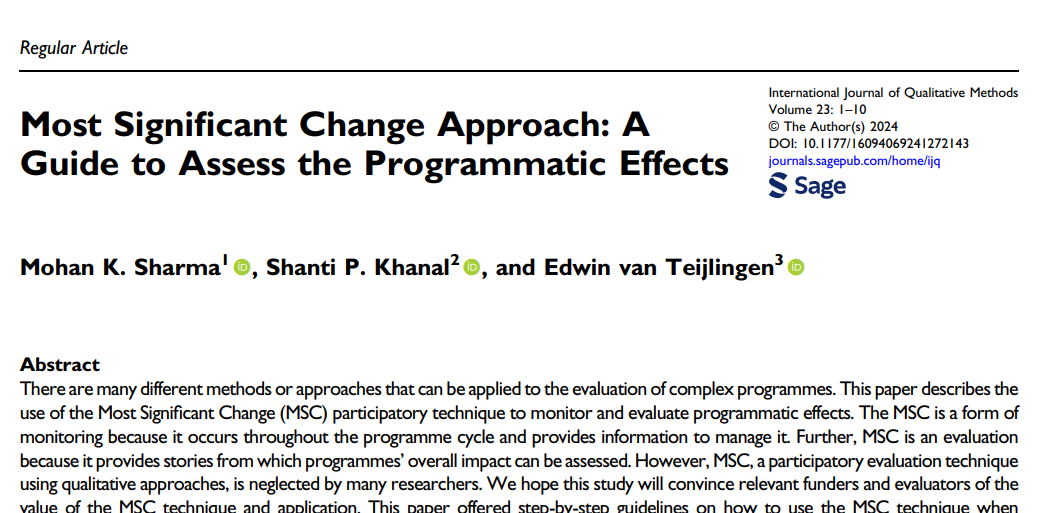
We hope to convince relevant funders and evaluators of the value of the MSC technique and application. Our paper offers step-by-step guidelines on how to use the MSC technique when evaluating a large-scale intervention covering perspectives of different beneficiaries within a limited period. The MSC process involves purposively selecting the beneficiaries, collecting the Most Significant (MS) stories, which are then systematically analysed by designated stakeholders and or implemented partners, selected through internal vetting, and external process by involving beneficiaries and stakeholders.
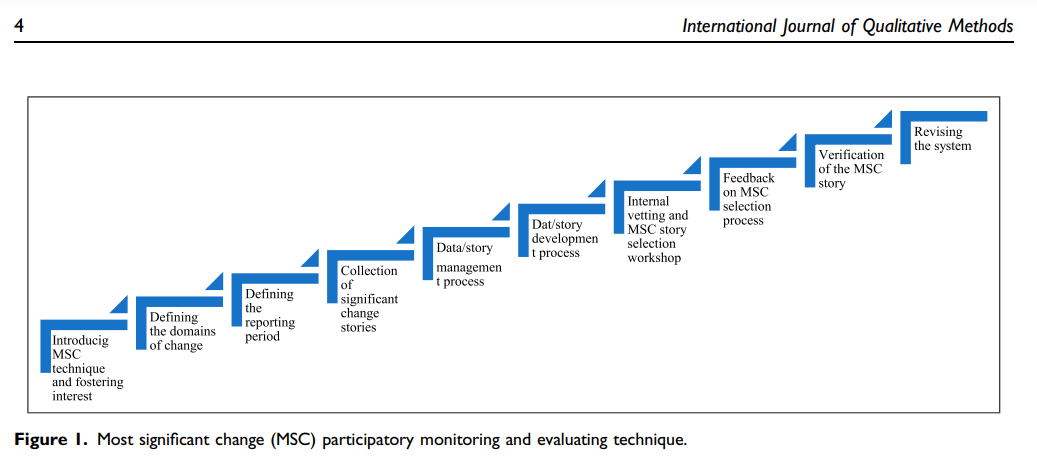 The central question focuses on changes in the form of stories such as ‘Who did what?’; ‘When did the change occur?’; and ‘What was the process?’ Additionally, it seeks feedback to explain why particular a story was selected as MS and how the selection process was organised. The MSC technique further attempts to verify the validity, significant, relevant, sustainability of the change, and impact on marginalized or Gender Equality and Social Inclusion (GESI) groups brought by the programme. Furthermore, the technique seeks verification of the MS story by triangulating comprehensive notes and recordings.
The central question focuses on changes in the form of stories such as ‘Who did what?’; ‘When did the change occur?’; and ‘What was the process?’ Additionally, it seeks feedback to explain why particular a story was selected as MS and how the selection process was organised. The MSC technique further attempts to verify the validity, significant, relevant, sustainability of the change, and impact on marginalized or Gender Equality and Social Inclusion (GESI) groups brought by the programme. Furthermore, the technique seeks verification of the MS story by triangulating comprehensive notes and recordings.
Prof. Edwin van Teijlingen
Centre for Midwifery & Women’s Health

Reference:
The start of October has not been good for me in terms of grant applications.  On the first day of October the NIHR informed us that our application to the call for a research programme for social care was unsuccessful. The reason given by the NIHR panel was that our proposal was not competitive enough, this was a BU-led proposal working with colleagues based in Dorset.
On the first day of October the NIHR informed us that our application to the call for a research programme for social care was unsuccessful. The reason given by the NIHR panel was that our proposal was not competitive enough, this was a BU-led proposal working with colleagues based in Dorset.
Four days later another application to the NIHR, this time to another different funding stream, was rejected by Global Health Research Programme Funding Committees. This second failed grant application was written by an international interdisciplinary team led by the Canterbury Christ Church University. It was a follow-up of our successful study ‘The impact of federalisation on Nepal’s health system: a longitudinal analysis’, which was funded by the UK Health Systems Research Initiative, itself a collaboration of the MRC/FCDO/Wellcome Trust/ESRC; Grant ref. MR/T023554/1.
To rub salt in the wounds, an international funding body, a joint initiative of the Agence Nationale de la Recherche (ANR; France), the Deutsche Forschungsgemeinschaft (DFG; Germany), the Economic & Social Research Council (ESRC; UK) and the Social Sciences & Humanities Research Council (SSHRC; Canada). The secretariat emailed us a few days ago than our application was not short-listed in this very competitive call, where 90% of applications were rejected.
Some of these proposals can, and will be, revamped and resubmitted to other funding bodies.

Prof. Edwin van Teijlingen
Centre for Midwifery & Women’s Health